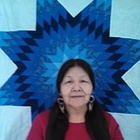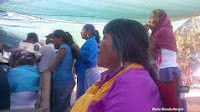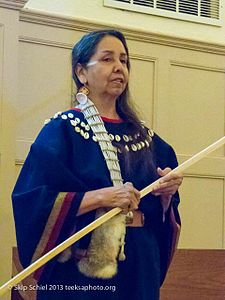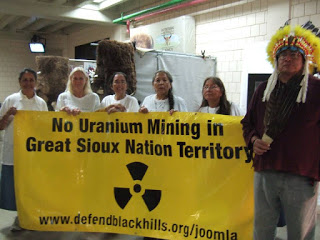| Online: | |
| Visits: | |
| Stories: |

| Story Views | |
| Now: | |
| Last Hour: | |
| Last 24 Hours: | |
| Total: | |
First Voices: Three Dynamic Native Women Speak with Tiokasin Ghosthorse
Three dynamic Native women speak, on the importance of language, abuse by US Border Patrol, and how uranium mining is poisoning water supplies in Lakota territory and the west
By Brenda Norrell
Censored News
English with Dutch translation by Alice Holemans, NAIS Gazette
Tiokasin Ghosthorse, Lakota, host of First Voices Indigenous Radio, interviewed three dynamic Native American women on his show Thursday, broadcast nationally on WBAI New York.
Violet Catches, Lakota, shares her life journey of teaching Lakota language. Ofelia Rivas, O'odham, describes the trauma for O'odham living in the militarized borderzone with the brutality of US Border Patrol agents who interfere with ceremonies. Charmaine White Face, Lakota, describes how the Crow Butte uranium mine is poisoning the water supply in Pine Ridge, and abandoned uranium mines have contaminated water supplies in Lakota territory and throughout the west. 
Violet Catches, Cheyenne River Lakota, describes her life journey of teaching Lakota language to students beginning at the Pierre Indian Learning Center, South Dakota, and continuing until today on Cheyenne River. She describes similarities in Lakota with Ho-Chunk, Winnebego and Omaha.
Violet shares how she teaches Lakota language on Cheyenne River, and how some of the early childhood language has been lost. She also explains how some words can not be translated across languages.
Violet teaches at the Takini School on Cheyenne River. She said 'Takini' refers to the survivors of the massacres, and the word was also used in earlier times.
“Some survivors came back from Wounded Knee,” she said of the survivors who returned to Cheyenne River from Wounded Knee as young boys.
 |
| Ofelia Rivas with Yaquis in Sonora, Mexico. Photo Brenda Norrell |
Ofelia Rivas, O'odham lives on traditional O'odham land, on the so-called Arizona border.
Tiokasin describes how Ofelia exposes the abuses by US Border Patrol agents and how O'odham ancestors graves were unearthed during construction of the border wall. Ofelia has been abused and held at gunpoint by agents.
Ofelia recently spoke at the “Native Americans Bearing Witness Retreat,” in the Black Hills.
Ofelia said, “People are not aware that we are living in a militarized zone.” Since 911, the abuse of O'odham by US agents has intensified.
Ofelia describes how O'odham have the responsibility to care for the land with ceremonies and offerings. Today, however, the O'odham people live in a condition of fear. Border Patrol agents interrupt O'odham ceremonies, and interfere with all living things, including the plants and animals.
When O'odham walk outside their homes in their homeland, they are asked for their papers by US Border Patrol agenst. O'odham who are simply living their lives are questioned and considered to be criminals by Border Patrol agents.
Speaking of the way of life and ceremonies, Ofelia said the people have a responsibility to keep things in balance. She says it is the nature of the people to be generous.
Recently, Border Patrol agents showed their disrespect and their lack of sensitivity to O'odham culture when they placed deer antlers on a Border Patrol trailer and drove it around O'odham land.
Meanwhile, Border Patrol agents are also collecting items that are sacred.
“It doesn't matter to them,” Ofelia said. “They think they can do what they want on O'odham land.”
In closing, Ofelia said, “We are still here, we are alive, and we are thriving.”
More: O'odham Solidarity Project
http://www.solidarity-project.org/
Charmaine White Face, coordinator of Defenders of Black Hills, describes the current hearing on the Crow Butte uranium mine in Crawford, Nebraska.
Charmaine White Face, spokesperson for the Sioux Nation Treaty Council established in 1894, said there are five deep wells which provide water for Lakotas living in Pine Ridge.
“There is contamination of uranium,” and other radioactive contaminants.
Leakage from the Crow Butte uranium mine is considered to be the cause.
“It could definitely be polluting the water that the people of Pine Ridge drink.”
Besides the Crow Butte uranium mine, there are abandoned open pit uranium mines contaminating Lakota water supplies.
“They have never been cleaned up.”
There are 272 abandoned radioactive uranium mines in South Dakota, polluting the air with the radioactive dust and the water with radioactive runoff.
“Companies just walked away and left these big holes in the earth that are still emitting radiation,” she said. This silent contamination is ignored, or unknown, by most, as uranium mining companies push for more mining.
This silent contamination is ignored, or unknown, by most, as uranium mining companies push for more mining.
“It doesn't just affect us here,” she said.
All the rivers in Lakota territory have uranium contamination and empty into the Missouri River, she said.
Ten million people are effected by this radiation contamination in the west.
“They are all breathing in this radioactive dust.”
Tiokasin adds how the radioactive contaminated water is sprayed on the foods in the bread basket, contaminating the country's food supply.
More:
www.defendblackhills.org
www.cleanupthemines.org
Listen to this show: Scroll down the WBAI archives for First Voices Indigenous Radio, Thursday, Aug. 27, 2015
http://wbai.org/server-archive.html#archives
THURSDAY, AUGUST 27, 2015: “First Voices Radio” Host Tiokasin Ghosthorse talks with Violet Catches, Lakota Language Teacher, Takini School, Cheyenne River Reservation, South Dakota; Ofelia Rivas, Elder and Activist from the Tohono O'odham Nation, Founder of O'odham Voice Against the Wall; and Charmaine White Face, Coordinator of Defenders of the Black Hills, an all volunteer environmental organization, and the traditionally appointed Spokesperson for the Sioux Nation Treaty Council established in 1894.
WBAI NYC 99.5 FM. Streaming live everywhere at WBAI.ORG (9-10 am EDT / 8-9 am CDT / 7-8 am MDT / 6-7 am PDT and 3-4 am Hawai’i Standard Time. After the show airs live, listen to the archived version and/or download at (1)http://www.firstvoicesindigenousradio/program_archives or (2) http://wbai.org/server-archive.html#archives Scroll down to First Voices Indigenous Radio August 27, 2015.





Brenda Norrell has been a news reporter in Indian country for 29 years, serving as a writer for Navajo Times and a stringer for AP and USA Today during the 18 years she lived on the Navajo Nation. After being a longtime staff reporter for Indian Country Today, she was censored and terminated. She then created Censored News, focused on Indigenous Peoples and human rights, now in its fifth year.
Source: http://bsnorrell.blogspot.com/2015/08/first-voices-three-dynamic-native-women.html




